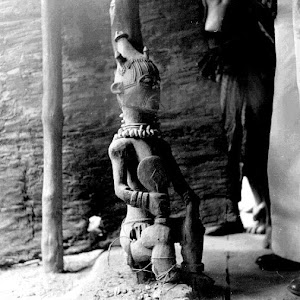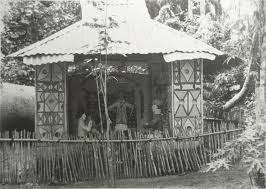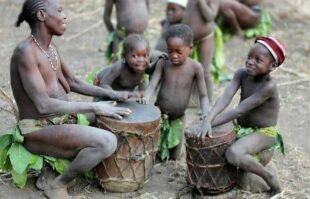In Nigeria, there are over 200 ethnic groups and each has its own cultural beliefs and perception of religion. Before the advent of colonization to date, traditional religion has been sustained from one generation to another.
Just as we have “Sango” (god of fire) in the Yoruba empire, we also have Amadioha in the Igbo ethnic group. These gods are worshipped as a result of the landmark behaviour they exhibited while they were alive. Also, they are celebrated to date because they are relevant to the culture and tradition that make up their ethnicity.
The Igbo people of southeast Nigeria’s Amadioha are known for their Arusi or Agbara of thunder and lightning. Amadioha is one of the most well-known Igbo gods and is also known as Amadiora, Kamalu (short for Kalu Akanu), Kamanu, or Ofufe in different areas of Igboland.
History has it that Amadioha’s planet in astrology is the Sun. Astrologers also revealed that his emblem is a white ram, and his colour is red. In a metaphysical sense, Amadioha stands for the people’s unified will. He is frequently linked to Anyanwu, the Sun God of the Igbo people. Also, Amadioha is more dominant in the southern half of Igboland, whereas Anyanwu is more prominent in the northern section.
To celebrate Amadioha, Eke, the first market day of the Igbo four-day week, is the day set apart to worship him.
In this piece, I will be revealing the history of Amadioha, the god of thunder of the Igbo people, his life’s experiences and why people serve him.

History of Amadioha
There are various stories of Amadioha’s birth, he belonged to the Diala caste, also known as the Free Born caste. However, the birth has not been picturesquely documented anywhere to date.
Some deities or objects represent the thunderbolt or meteorite stone that God hurls to strike the wicked or evil-doers to death. Amadioha (god of thunder) is one of the categories or groups of divinities that is claimed to represent the manifestation of the wrath of the Supreme Being.
As a result, Amadioha belongs to the category of deities known as war divinities, frequently represented in the Mbari house by a figure of a man brandishing a rifle. It is thought that the god Amadioha possesses immense military power. It is also referred to as the “General” of all the deities in Igboland, as well as a military engineer, tactician, an armiger.
Amadioha had several exciting experiences throughout his youth, including leading the Ndi-Okoroukwu, Isiagu, and Ihube citizens in the Battle of Isikwuato at the age of six and engaging in combat with a lion. The defeat at Okigwe was another name for this. At the age of 17, with his dada hair and hairy chest, he took the lead in the battle. His longtime companion Urashi was slain during this conflict. Urashi’s assassination was planned by Ugwu, the God of Pride, who was later assassinated at night by Amadioha in retaliation for Urashi’s death.
History has it that there was a time when one of the Legge rulers sought to bury the Isi Mbido, the sacred scripture of the Igbo people, in Nsukka but instead destroyed it in Enugwu, on one of the hills. Once more, Amadioha took the initiative in a battle to recover the text which resulted in the king’s death.
Meanwhile, Isi Mbido stood for a lot of things to Amadioha, which invaders took the logographic manuscript and transported it to Ikot-Ekpene. When Amadioha learned about it, he started a new war against the raffia city and obliterated it. He took the Isi Mbido, which he had taken to Uturu to celebrate his triumph, with him.
However, the sacred collection of books known as Isi Mbido describes Eluigwe’s creation of the Igbo and describes how Amadioha’s father, Nka, who was made from the taproot of an oji tree, is considered to be the most significant text of the Igbo people. The now-lost literature spoke about the Supreme Being, Eluigwe, the Universe, Chukwuabiama, and the Universe’s Creator, Orisa.
The earliest stories about Amadioha describe his encounters with the water spirits, the three-headed lions he killed, the Battle of Isikwuato, the War at Okigwe, the Conquest of Ikot-Ekpene, the Battle of Mbano, the union of Amadioha and Uhammiri, the death of Urashi, the murder of Ugwu, and many other vividly coloured tales. Later, legends that have been passed down through the ages tell of his exciting adolescence, during which Amadioha used his adept weaponry skills to good purpose to vanquish a variety of terrifying foes, demons, and monsters.
Over the years till date, there have been controversies about the birth and physique of Amadioha but there are some things that have remained consistent about him- describes him as having “dada hair” and he was seen constantly carrying a ram, which was known to represent Amadioha. Also, when travelling across the verdant hills and valleys, Amadioha and his ram drank water from the same gourds.
The great Igbo god Nka once sat by the root of an oji tree in the middle of Nkwo-Achara and sang to Anyawnu, the God of the Sun, and Nwanyianyanwu, the Goddess of the Sun, and his wife Achara, who gave birth to Amadioha, in their presence. At Nkwo-Achara, the largest market in Uturu, the child was inserted into Achara’s womb in this manner. Unfortunately for Amadioha, Onuma (God of Mercy), his mother’s brother, had just perished in battle. So it was considered that Onuma was a reincarnation of Amadioha.
As a result of warnings that Achara’s first child would perish, just like his uncle, Nka took his son and a ram to the Forest of Ihube to offer sacrifices to the Sun God. Fortunately, following the sacrifices, Achara and Nka took the precaution of concealing Amadioha in the far-off village of Ihube, where the young man was raised as a straightforward cowherd. He had a happy upbringing there and won the hearts of many men and women; he only raised rams since they stood for grit, initiative, action, and leadership. The ram is also a representation of Aries, an astral sign of authority.

Duties of Amadioha
Amadioha is mostly regarded as a god of justice, who uses lightning to strike and thunder to converse. He sends “thunderstones” down to earth to produce thunder and lightning. Thus, those who are found guilty by Amadioha are either struck by lightning and slain, which leaves a black mark on the forehead, or they are bee swarmed. Since the punishment is believed to be just one from God, the property of the victim is typically collected by the priests of Amadioha, and the body is left unburied and the person unmourned.
Amadioha is not just a deity of justice but also of love, peace, and unity. He is invoked for the growth of crops, the presence of children at home, and generosity. Amadioha also signifies a messianic promise for those in dire circumstances, which is different from most African religious worldviews.
Amadioha is also regarded as a creator god. According to some myths, he created humans when he sent a lightning bolt to hit a silk cotton tree, causing it to split open to reveal a man and a woman.
Furthermore, as a personal shrine, Amadioha represents the spirit of enterprise that generates wealth. It also serves as the household’s head’s representative. Because mashing the cow’s faeces causes skin peeling and widespread deaths of the populace, Amadioha (the deity god) abhors it, and as a result, the people of Ozuzu town in Etche Local Government Area of Rivers State of Nigeria do not consume Etu.
Amadioha’s Wives
Amadioha was attractive, charming, and had dada hair. He also performed music and danced a lot. As a result, history has it that he had 1,108 wives and fathered 70,000 sons.
Amadioha is frequently depicted as Ani’s husband. Ani is the Earth’s mother. The two are thought to be the first Arusi made by Chukwu, according to some Igbo beliefs. Mud-brick Mbari houses, which were constructed in their honour, are frequently erected.
However, Uhammiri was Amadioha’s favourite wife; they were blessed with a boy named Ndanike and a daughter named Kwokomoshi. After many years of cordial relationship with Amadioha, Uhammiri later perished in the lake.

The Fall of Amadioha
In his intrepid youth, Amadioha participated in numerous misadventures. The kills and thrashings of his numerous opponents, including the ogre Ara, a huge dragon, a serpent that stayed by his side at night, and the horse with two heads, stand out among them. The cunning tyrant Ikenga (God of War), whose beheading Amadioha used to install himself as king of Uturu, was also swiftly dealt with.
Alusi, the God of Karma, who Amadioha defeated using only his fists, Nwala, the son of the Earth who had amassed a harem of 8,000 captured women, and the sea-demon Mmiri, who had the appearance of a conch shell and lost his magic shell to Amadioha, which the hero carried afterwards and used as a trumpet, were among the many demons that the hero killed.
Amadioha also had the time to defeat the sea god named Urashi, the fire god named Oku, and even lift the Enugwu, the God of Hills and Valleys, to stop a dreadful downpour sent by Kpakpando (the Star) to Ikot-Ekpene, and the floating mafia city of the Invaders. Amadioha not only wreaked havoc on the Osus, Umes, and Ohus, but also on simple mortals. He took possession of them and gave them to himself. They were made into his slaves and consorts.
Amadioha constructed the large fortified city of Uturu as it is today in Isikwuato throughout previous exploits. Seven days after Amadioha was unintentionally slain when a hunter’s arrow mistakenly struck his heel in the presence of his favourite ram, Aguba, Uturu was swallowed up by the ocean and drowned, turning the ruins of a once-vibrant town into nothing. Additionally, Amadioha had bested Agwu, the God of Possession, by stealing the revered oha tree from Mbano. The tree was planted by Amadioha at Uturu, but after his passing, it was brought back to Agbaja in Ehime Mbano.
Amadioha’s Legacy
Many Igbo worshippers still adore him today as the supreme deity, and this is especially true in the eastern Nigerian towns of Mbano and Uturu. The Ibu Uzo Festival in Ehime Mbano, which is only held during the dry season, is one of the many celebrations held in his honour. Because Amadioha is thought to ride a ram, funerals are avoided during wet seasons.
Furthermore, Amadioha, also known as Kamalu was transformed into an oracle by the community of Ozuzu in pre-colonial times, who named it Kamalu Ozuzu. In addition, people pray or curse using proverbs- Amadioha gbagbukwa gi” (Amadioha will strike you) and Chi m le kwee – O wuru si o wu mu mere ihea, amadioha gbagbukwe m (My god please see- If it is true that I did this thing, let Amadioha strike me).
Also, festivals called Ibo Uzo (or Mbom Uzo) honour Uhammiri’s successful effort to convince Amadioha to go back to Mbano following the Conquest of Ikot-Ekpene, which took place during harvest. Early to mid-December sees the celebration of Amadioha, which may be the most widely observed. Devotees march around the villages while intoxicated, giving people mkpurusu, and burning mpanaka and ederi at midnight.






Comments
Opara Anayochi
3 years agoThanks for your enlightenment but Amadioha symbol is a pure white ram with wings and she have a think black eyes with a lovely horn …. I was opportune to saw her in my village many years ago when my grandmother was still alive , she was the person that told us that this is Amadioha . The time was 5pm in my village. Ahiazu Mbaise in imo state .. I was having dinner with my siblings and my grandma . We all was surprised to hear the thunder strike within some few munites it’s started raining, all of a sudden, everywhere was clouded, immediately we saw a white Ram with wings with a black think eyes that was flying towards our community … I must tell you she fly faster than jet …her strikes breaks the ground and hit the tree with a fire … it was unimaginable moment in my village because everyone thought the world have ended when we all ran inside the house and locked our doors … Amadioha is GOD of Justice… I’m very happy to experience such a wonderful moment ❤️🩹❤️🩹 May Amadioha Guard and protect US All more especially Igbo Nation … Ise Ise Ise